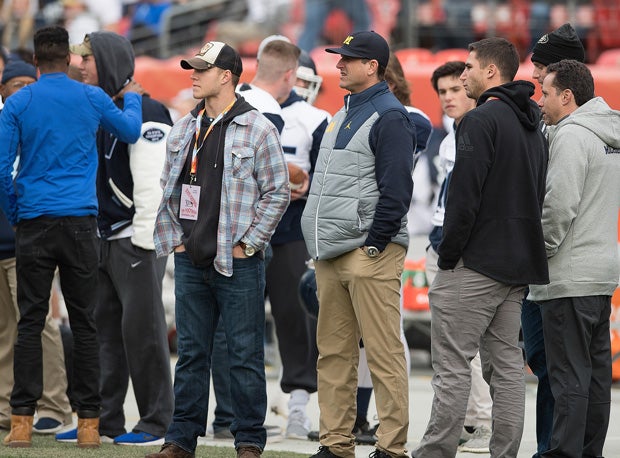Video: Alabama commit can make 70-yard field goals
See a Louisiana recruit with a big leg.This is the first in a three-part series on how high school coaches can get more involved in getting their players ready for National Signing DayChad Johnson is in his sixth season as the recruiting coordinator at
Spring (Texas), a 6A program with about 3,100 students in the school. I've gotten to know coach Johnson via Twitter over the last few years, and have been really impressed with everything he does, and what his school does to get its kids noticed. He has done a great job of building relationships with college coaches, and estimates that he has about 175 contacts in his database right now.
I recently had the pleasure of meeting coach Johnson at the American Football Coaches Association Convention in Nashville. We talked recruiting.
How do you go about building relationships with college coaches?"There are many ways to go about building relationships with college coaches. The first and easiest is direct interaction when the coach comes to the school to recruit our kids. We have an advantage over many high schools in that we are located in Houston, a hotbed of football recruiting, and also we are just 20 minutes from Bush Intercontinental Airport. We see colleges from across the country come here to recruit. I had a coach from Syracuse stop in because he was in town for a wedding and happened to drive right by the school. Therefore, he decided to stop in and see if we had any kids. I typically see over 100 different schools from across the country stop by Spring High in a year.
"The other way to build relationships with college coaches is to attend coaching clinics and conventions. Attending a clinic such as Glazier Clinics or the Lone Star clinic will allow you to not only talk X and O football but also to get to know people, expand your network. Obviously, conventions such as the AFCA allow you to meet and network with hundreds of college coaches. Lastly, I would say the use of social media, specifically Twitter, allows a coach to reach out to college coaches. Ask them to follow you back so then you can chat with them via direct message.
"Once you have established contact with a coach, continue to build the relationship by texting, calling and emailing them. I think the No. 1 thing to building a relationship with a college coach is to establish trust. The best way to do that from my perspective is to be 100 percent open and honest about a prospect. I will not lie to a college coach about a kid, and I tell my kids the same thing. I will not lie for you. I do not lie about height, weight and (40-yard dash) times. If a kid is a discipline problem, has grade or attendance issues, etc., I am up front and honest with the college coach about that.
"These coaches have very limited time and ability to vet a prospect due to NCAA restrictions on face-to-face meetings. Too often a high school coach will tell a college coach "Oh yeah, he's a good kid" because they want the kid to get an offer or be recruited. I want my kids to be recruited and to get offers as well, but I will not sacrifice my reputation for one kid. If I betray the trust of that college coach, then the next time when I have a good kid and I am being honest about, they may not believe me because I have lied in the past about a young man. I refuse to harm our program and the kids who will be recruited in the future just so a kid today can get an offer. If he is good enough and the school wants to offer him, great. However, I want them to know all of the risks involved."
What's your best advice for recruiting coordinators and high school coaches out there?
Whether it's Jim Harbaugh (pictured) or a small college coach, treat them all the same.
Photo by Paul DiSalvo
"Be honest would be my No. 1 piece of advice. Do not lie about kids. Do not hide the questionable issues or behaviors of the prospect. Be up front, open and honest with the college coach so they can make the best decision possible for their program on whether to bring in a young man as a part of their team.
"My second piece of advice would be to not "Big time" small college coaches. I try my best to treat every college coach the same whether they coach at the University of Texas or Maryville College. Some high school coaches will cater to a Power 5 coach and put the small college coach on the back burner while they are in the school. I try very hard to treat every one of those coaches the exact same.
Chris Fore is a veteran Head Football Coach and Athletic Director from Southern California. He consults coaches and programs nationwide through his business Eight Laces Consulting.
